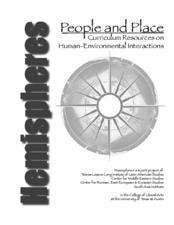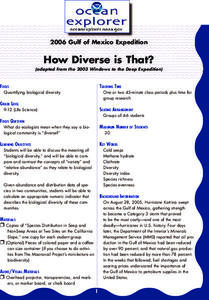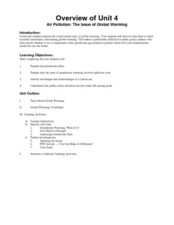Government of South Australia
Don't Waste Your Energy
Don't lift another finger, this physical and environmental science unit has everything you need to begin teaching your class about energy. Starting with a look at the greenhouse effect, these lessons and activities take young scientists...
Cal Recycle
Conserving Natural Resources
Trying to plan an engaging elementary science unit on natural resources? Conserve your energy! This five-part series of lessons and hands-on activities has exactly what you need to teach young scholars about the importance of conservation.
Society of Petroleum Engineers
Renewable and Nonrenewable Energy
Energize an environmental science unit on natural resources with this collection of instructional materials. From simple coloring sheets for primary grade children, to guiding questions for a high school research...
Consortium for Ocean Science Exploration and Engagement (COSEE)
Plankton to Penguins: Antarctic Food Web
A well-written lesson plan, second in a series of four, gets high schoolers exploring how the Antarctic food web is impacted by climate change and the associated melting of polar ice sheets. It begins with a PowerPoint presentation about...
Consortium for Ocean Science Exploration and Engagement (COSEE)
Ocean Acidification: Whats and Hows
Open this lesson by demonstrating the production of acidic carbon dioxide gas by activated yeast. Emerging ecologists then experiment with seashells to discover the effect of ocean acidification on shelled marine organisms. They measure...
Curated OER
Ghostbusting in the Chesapeake
Ghost pots, fishing gear lost during crabbing expeditions, continue to trap crabs that are never collected. Increase your budding ecologists' awareness of human impact on the environment as well as conservation efforts using this...
Rain Bird Corporation
Rain Forest Teaching Curriculum
Take young naturalists on an exploration of the world's tropical rainforests with this extensive collection of lessons and activities. Whether its creating leaf and flower prints or investigating the absorption spectrum of...
Curated OER
Hemispheres: People and Place
Here is an astounding series of lessons, designed for high schoolers, on environmental policy. By studying water conservation in rural India, the role of the government, and the reaction of the people, learners begin to formulate...
Kenan Fellows
Making Connections with Water Quality
What's in your water? And, why is water quality so important? Enhance your class's level of water appreciation through a lesson that demonstrates the necessity of water quality. Environmental enthusiasts explore the EPA's Clean Water...
Curated OER
How Diverse is That?
After reviewing biodiversity, learners work in small groups to analyze actual species distribution data. They learn to calculate the Shannon-Weaver diversity index for different communities. Though not particularly engaging, the content...
Curated OER
Unit 2: Global to Local: Understanding My Place in the Hydrosphere
What does the ground around your home have to do with water pollution? Young ecologists learn about their local watershed and create their own cause-and-effect models of the hydrosphere.
Curated OER
Watering Our Prairie Farms
After reading an article about irrigation on Canadian farms, learners participate in a discussion. They individually write an opinion paper about the surrounding issues. A lesson like this can be used in an earth science class when...
Curated OER
Urban Ecosystems 2: Why are There Cities? A Historical Perspective
Second in a series of five lessons, this lesson encourages preteens to consider cities as urban ecosystems. First, they keep a food diary for a few days. They visit the Natrional Agricultural Statistics Service website for current data...
Curated OER
Streetfilms' Moving Beyond the Automobile
This is an exceptional series that you can use in an environmental or engineering unit. There are four lessons: "Sustainable Transportation," "Designing for Safety," "Changing the Landscape," and "Engaging in Policy." Each lesson...
Curated OER
Fossil Fuels (Part II), The Geology of Oil
More of a mini-unit than a lesson plan, these activities lead inquisitors through a survey of oil deposits. In the first part, they read about and view diagrams of sedimentary rock layers that trap oil. Next, they test porosity and...
Curated OER
Air Pollution: The Issue of Global Warming
Here is an outstanding 10-page lesson plan on global warming. Learners discover that there is a lot of controversy surrounding this topic in that the science behind global warming is difficult to prove. The best thing about this plan is...
Curated OER
Flower Power
This fascinating series of four lessons use the paintings of artist Robert Harris to illustrate different types of ecosystems, and the harm that comes to them from human policy. A global view of environmental policies are studied, which...
Curated OER
Hazards: Second Grade Lesson Plans and Activities
Equip learners with safety knowledge in the case of an earthquake. After coloring the places to go to get help after a quake, and label places that wouldn't be safe to go after a quake, young geologists simulate three levels of...
Foundation for Water & Energy Education
How Can Work Be Done with Water Power? Activity A
Environmentally friendly engineering teams construct a water wheel and experiment with its speed and the resulting amount of weight it can lift. Consider following this activity with two more of the same title by the same publisher when...
Montana Natural History Center
Studying Grassland Ecosystems
At first glance, grassland ecosystems might seem dull and uninteresting, but once you start to explore it's amazing the things you'll find! Through this series of engaging lessons, activities, and experiments, elementary students examine...
Curated OER
Pavement or Dirt?
What are the pros and cons to having either permeable or impermeable materials for building? How do they affect the environment? Use this role-play and the extension activities to get your environmental scientists thinking about the...
Population Connection
Where Do We Grow from Here?
Did you know that the population is expected to grow to 11 billion by 2100? The resource serves final installment in a six-part series on the global population and its effects. Scholars interpret data from the United Nations about the...
Texas State Energy Conservation Office
Investigation: Waves and Whistles
Wave goodbye to the same old demonstrations for alternative energy sources, and wave hello to this one investigating ocean waves! Using a water bottle to create an oscillating water column, learners see and possibly hear how the...
Curated OER
Fish Tales
Have your class learn about marine life. Learners write a story about a fish, create an art project, and share their work with the class. This experience could be enhanced by having them conduct Internet research to discover some of the...























